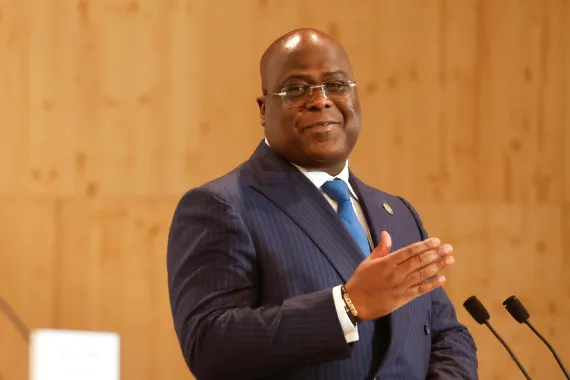DRC’s President Tshisekedi reshuffles cabinet ahead of election
The Democratic Republic of the Congo’s President Felix Tshisekedi has appointed the country’s former vice president Jean-Pierre Bemba, who was imprisoned for more than 10 years for war crimes, as defence minister in a sweeping government reshuffle.
His appointment was part of an overhaul of the 57 member-cabinet, which the president’s spokesperson said was “urgent and necessary”, in an announcement on national television late on Thursday. No further details were given.
The reshuffle, which was more extensive than observers had predicted, comes just months before a presidential election on December 20, in which Tshisekedi is likely to seek a second term.
“This a deeply political shuffle,” said Jason Stearns, director of the Congo Research Group and professor at Canada’s Simon Fraser University.
Presidential candidates are expected to be announced next October, with a final list due in November. One likely challenger for the presidency is Martin Fayulu, who claimed victory in the 2018 poll. Another is Moise Katumbi, former governor of the oil-rich Katanga province.
Tshisekedi appointed Vital Kamerhe, his former chief of staff who was released from prison in December 2021 following an embezzlement conviction, as economy minister.
Nicolas Kazadi was maintained as finance minister.
The appointments bring political heavyweights into the government, strengthening Tshisekedi’s coalition before elections, Stearns said.
“Key positions are given to senior politicians who have large constituencies to please but little expertise in their new ministries. Kamerhe is not an economist. Bemba was a rebel but has little formal military training,” he said.
Kamerhe, an influential Congolese power broker, was sentenced to 20 years in prison in 2020 for embezzling nearly $50m from a presidential economic programme. He denied the charges.
His sentence was reduced to 13 years on appeal the following year but a higher court overturned the judgement in June 2022.
Bemba, a former rebel leader was arrested in 2008 by the International Criminal Court for war crimes and crimes against humanity committed by his troops in the Central African Republic between 2002 and 2003.
He was acquitted and released 10 years later after his conviction was reversed on appeal. He was, however, accused and convicted on lesser charges of witness tampering during the trial.



